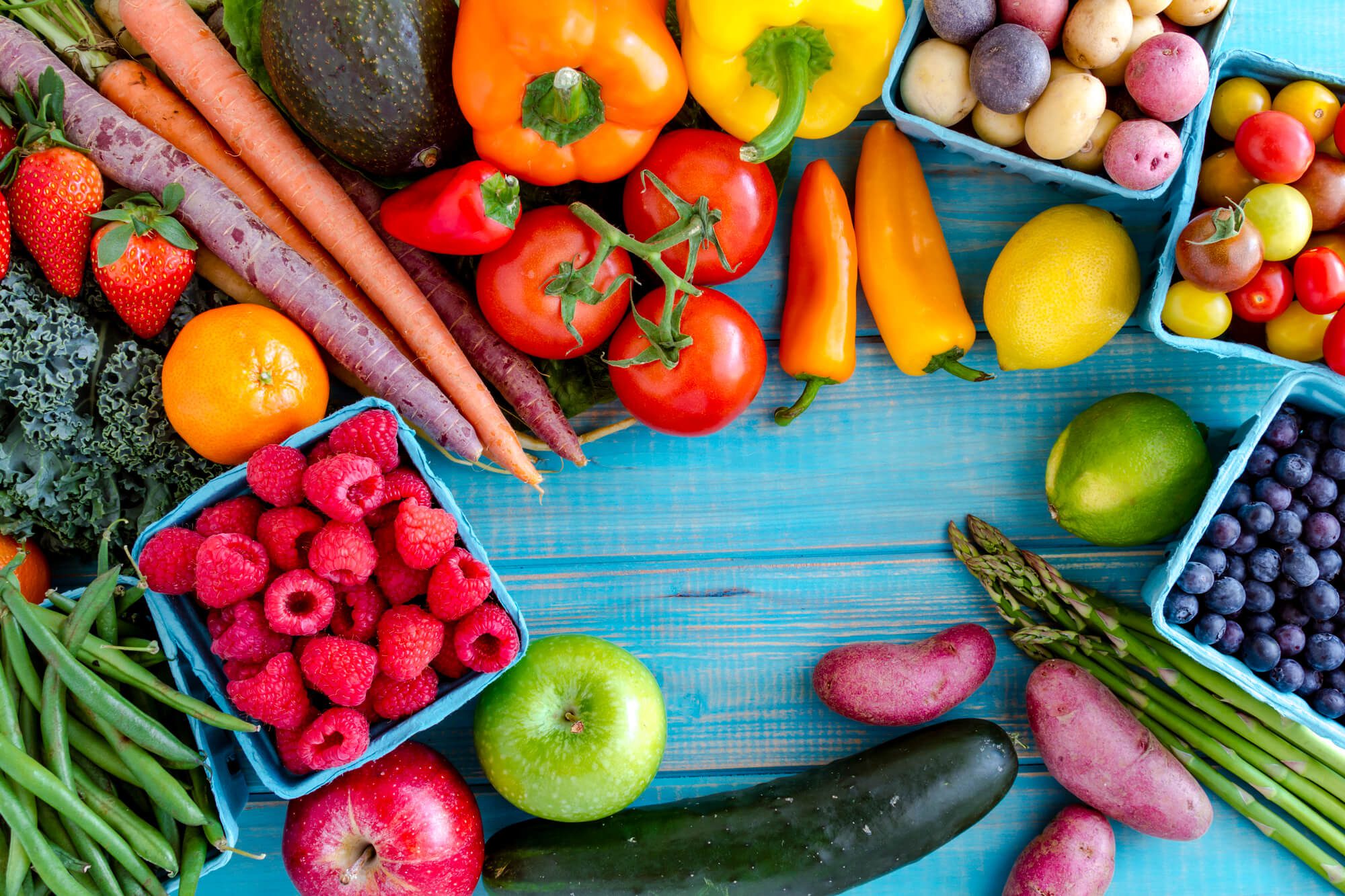How Gluten Free BBQ Sauce Elevates Your Vegan Grilling Game
How Gluten Free BBQ Sauce Elevates Your Vegan Grilling Game
Blog Article
Everything About Healthy And Balanced Food: Advantages of Taking On Plant Based Choices
The conversation surrounding plant-based diets has gained substantial attention in recent times. Several individuals are checking out the possible health and wellness benefits, dietary advantages, and ecological influences connected with these dietary options. As people become more knowledgeable about their food's influence on health and sustainability, concerns emerge regarding the usefulness of taking on such a way of living. What details changes can one anticipate, and how might these choices reshape not only individual health but also the world's future?
Comprehending Plant-Based Diets
Lots of people connect plant-based diet regimens mainly with vegetarianism or veganism, these diet plans can incorporate a vast range of eating patterns that focus on entire, minimally processed plant foods. Such diet plans typically include fruits, veggies, whole grains, nuts, beans, and seeds, while limiting or eliminating animal items. This adaptability enables people to customize their dietary options according to individual preferences and dietary demands. Some may embrace a largely plant-based diet while still sometimes consuming meat or milk, typically described as a flexitarian strategy. The focus remains on integrating even more plant foods, which can bring about a diverse range of tastes and dishes. Understanding these different analyses of plant-based consuming is crucial for appreciating its ease of access and charm in modern food society.
Health Benefits of Plant-Based Foods
The health benefits of plant-based foods are substantial, using a nutrient thickness benefit that sustains overall well-being. Research indicates that these foods can enhance heart health and wellness and play a crucial role in effective weight management. By incorporating much more plant-based options, individuals may enhance their dietary choices and advertise lasting health and wellness.
Nutrient Density Benefit
Nutrient thickness plays a crucial duty in the wellness advantages of plant-based foods, making them an engaging option for those seeking a balanced diet regimen. Plant-based foods, such as fruits, veggies, beans, nuts, and entire grains, are usually abundant in necessary vitamins, minerals, and antioxidants while being lower in calories. This high nutrient density permits people to take in fewer calories while still meeting their nutritional requirements. Additionally, these foods are loaded with nutritional fiber, advertising digestive system health and wellness and helping in weight management. By including nutrient-dense plant-based alternatives, consumers can enhance their total health and wellness, support their body immune systems, and minimize the risk of persistent illness. Ultimately, the nutrient thickness of plant-based foods highlights their importance in a health-conscious way of living.
Heart Health And Wellness Renovation

Weight Administration Support
In addition to advertising heart wellness, a plant-based diet can substantially help in weight management. This nutritional approach stresses whole foods such as fruits, veggies, legumes, nuts, and entire grains, which are generally reduced in calories and higher in fiber contrasted to animal-based products. The high fiber material aids raise satiation, lowering overall calorie consumption. Plant-based diets are commonly abundant in vital nutrients while reduced in unhealthy fats, making it much easier to keep a healthy weight. Research study shows that people who embrace a plant-based way of life often tend to have lower body mass indexes (BMIs) and experience more effective weight reduction compared to those who consume meat-heavy diet plans. Embracing plant-based options is a critical selection for effective weight management.
Nutritional Value of Plant-Based Ingredients
Plant-based components are rich in necessary nutrients, supplying a varied selection of vitamins, minerals, and anti-oxidants that add to overall health. A comparison of protein resources discloses that while pet items are usually considered as superior, many plant-based options provide adequate healthy protein and various other valuable substances. Comprehending the nutritional value of these ingredients can help individuals make informed dietary options.
Necessary Nutrients in Plants
Nutrient-rich components discovered in plants provide a diverse array of essential nutrients that add considerably to general health. These ingredients are abundant in vitamins A, C, and K, which support immune function, vision, and blood clot, specifically. Furthermore, plants provide vital minerals such as magnesium, calcium, and potassium, important for heart health, muscular tissue feature, and bone strength. The presence of fiber in plant-based foods aids digestion and advertises a healthy intestine microbiome. Antioxidants, located generously in vegetables and Read Full Article fruits, help fight oxidative tension and decrease swelling. Furthermore, several plant foods are low in calories yet high in nutrients, making them a superb option for those looking for to preserve a healthy and balanced weight while guaranteeing ideal nutrient intake.
Comparing Protein Sources
Healthy protein resources vary considerably in their nutritional accounts, with plant-based active ingredients using distinct advantages. Unlike pet healthy proteins, which typically contain hydrogenated fats and cholesterol, plant proteins have a tendency to be reduced in these undesirable parts. Legumes, nuts, seeds, and entire grains are abundant in necessary amino acids, fiber, vitamins, and minerals. As an example, lentils offer high protein web content along with substantial iron and folate, while quinoa is a complete protein, offering all nine necessary amino acids. In addition, plant-based healthy proteins are typically come with by anti-oxidants and phytochemicals that sustain general wellness. The shift to plant-based protein sources not just boosts dietary consumption however also lines up with sustainable dietary methods, decreasing ecological influence and advertising lasting wellness benefits.
Environmental Influence of Plant-Based Consuming
As recognition of climate modification expands, numerous individuals are checking out lasting nutritional options that can greatly lessen their environmental impact. Plant-based consuming has arised as a significant contributor to reducing greenhouse gas emissions, which are mainly associated with animals production. The farming of fruits, beans, grains, and veggies usually calls for less resources, such as water and land, contrasted to pet farming. In addition, plant-based diets can lead to lowered deforestation, as much less land is needed for grazing animals or growing pet feed. By changing in the direction of plant-based options, customers can sustain biodiversity and advertise healthier ecosystems. Generally, accepting plant-based consuming not only advantages personal health and wellness yet also stands for an important action toward ecological sustainability and preservation initiatives.
Overcoming Common Misconceptions
While several individuals acknowledge the advantages of a plant-based diet regimen, several misunderstandings typically deter them from totally accepting this way of living. An usual idea is that plant-based diet plans do not have enough healthy protein; nonetheless, numerous plant resources, such as legumes, nuts, and tofu, give enough healthy protein. Additionally, some presume that this diet is expensive, when in fact, staples like beans, rice, and seasonal veggies can be fairly affordable. An additional misunderstanding is that plant-based consuming is extremely limiting, whereas it in fact offers a diverse selection of foods and flavors. Many stress that a plant-based diet regimen may lead to shortages, yet with proper preparation, people can acquire all needed nutrients, consisting of vitamins and minerals, while appreciating a large variety of tasty meals. Vast Tips for Transitioning to a Plant-Based Lifestyle
Making the change to a plant-based lifestyle can be an enhancing experience, though it typically requires some support to browse the first changes. First, individuals are encouraged to begin gradually, integrating even more fruits, vegetables, vegetables, and whole grains right into their meals while reducing meat and dairy intake. Meal preparation is vital; preparing a regular menu can help reduce the adjustment and avoid final harmful choices. Discovering brand-new recipes and cooking techniques can additionally boost the experience and keep exhilaration regarding plant-based consuming. Additionally, signing up with support system or neighborhoods can provide inspiration and share beneficial tips. Ultimately, remaining advice notified concerning nutrition guarantees well balanced meals, preventing deficiencies while cultivating a healthy, enjoyable plant-based way of living.
Delicious Plant-Based Meal Concepts
Checking out tasty plant-based dish ideas can inspire people to welcome a more healthy diet. One popular option is a hearty quinoa salad, including cherry tomatoes, cucumber, and a tangy lemon-tahini dressing. One more fave is a tasty lentil stew, packed with carrots, celery, and great smelling natural herbs, ideal for a comforting supper. For morning meal, over night oats made with almond milk, chia seeds, and topped with fresh berries provide a nutritious beginning to the day. In addition, a lively veggie stir-fry with tofu and a selection of vivid veggies can be a fast yet satisfying dish. Ultimately, velvety avocado salute on whole-grain bread, sprayed with flavors and seeds, provides an easy yet flavorful treat. These meals display the variety and splendor of plant-based eating.

Often Asked Inquiries
Can a Plant-Based Diet Plan Provide Enough Protein?
The inquiry of whether a plant-based diet plan can give enough healthy protein prevails. Many resources, including vegetables, nuts, seeds, and entire grains, can meet this website protein needs successfully, sustaining a balanced and nourishing diet plan for individuals.
Are Plant-Based Diet Regimens Suitable for Children?
The viability of plant-based diets for kids depends on cautious preparation. Sufficient nutrients need to be guaranteed, including proteins, vitamins, and minerals. With proper assistance, such diets can sustain healthy development and advancement in youngsters.
Just how Do I Eat in restaurants on a Plant-Based Diet regimen?
Eating in restaurants on a plant-based diet plan entails seeking dining establishments with varied menus, requesting alterations, and exploring vegan-friendly alternatives. Preparation in advance and connecting dietary preferences can boost the eating experience while maintaining nutritional options.
What Are Usual Allergens in Plant-Based Foods?
Common allergens in plant-based foods consist of soy, gluten, nuts, and seeds - Gluten Free BBQ Sauce. Individuals following a plant-based diet plan must recognize these allergens and read tags carefully to prevent negative responses and assure safe consumption
Can Plant-Based Diets Assist With Fat Burning?
Research indicates that embracing a plant-based diet plan may assist in weight management as a result of its generally lower calorie density and higher fiber content. This combination can improve satiety, assisting individuals manage their caloric consumption properly. Several individuals link plant-based diet regimens generally with vegetarianism or veganism, these diets can encompass a wide range of consuming patterns that focus on entire, minimally processed plant foods. Nutrient thickness plays an essential duty in the wellness advantages of plant-based foods, making them an engaging selection for those looking for a balanced diet. Plant-based diets have actually been revealed to significantly boost heart health and wellness, as they often include elements that support cardio function. In addition to promoting heart health and wellness, a plant-based diet regimen can considerably help in weight administration. A common idea is that plant-based diets lack sufficient healthy protein; nevertheless, various plant resources, such as legumes, nuts, and tofu, offer ample healthy protein.
Report this page